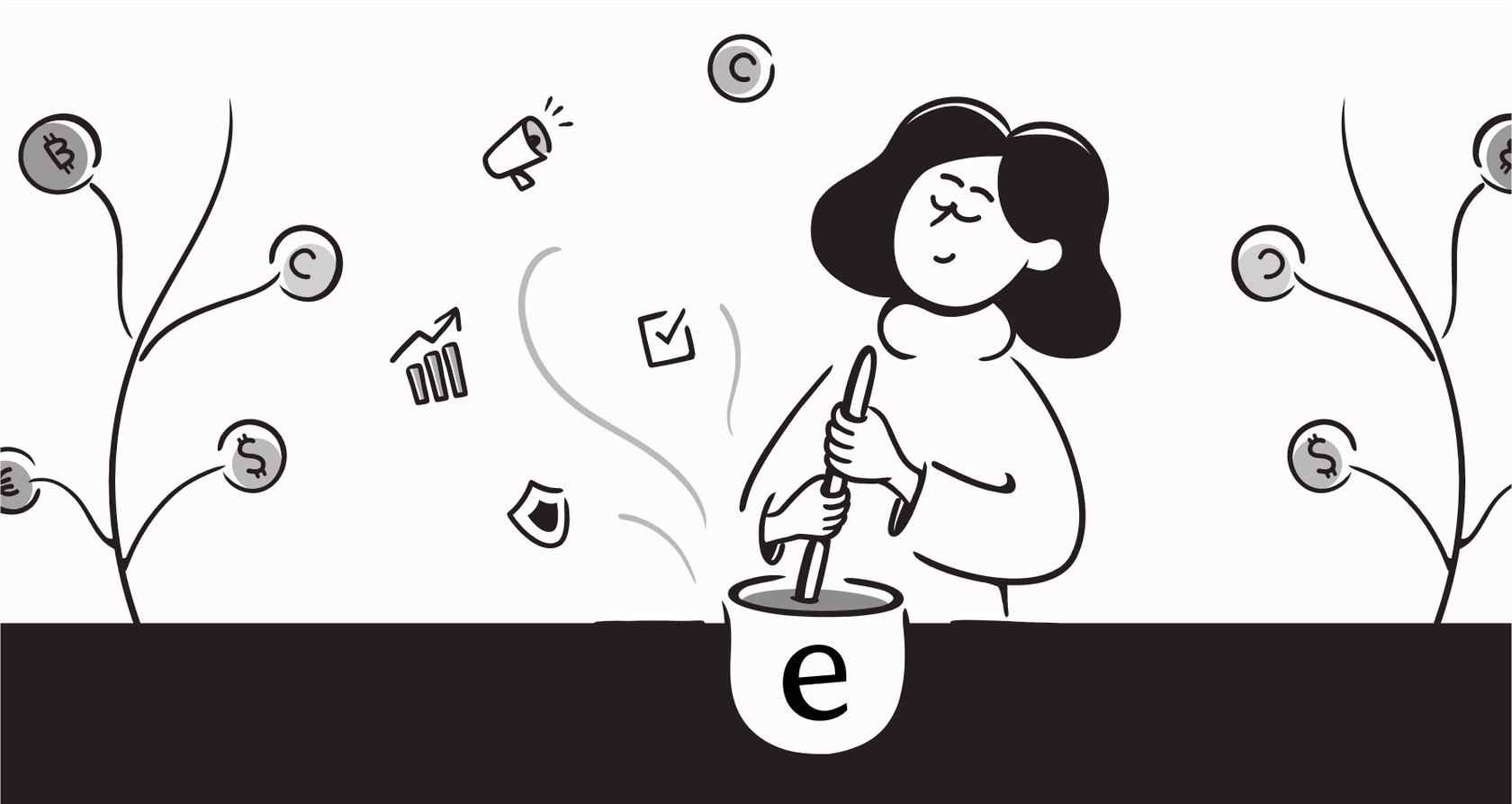
Your customers are online at all hours, and they expect answers now, not tomorrow. For any ecommerce store, trying to keep up with this demand for 24/7, personal support can feel like a losing battle. This is where an AI chatbot for ecommerce can make a real difference. We're not talking about those simple pop-ups that just say "How can I help you?". Today’s chatbots connect with your business to help drive sales, solve problems instantly, and create happier customers.
This guide will walk you through what an AI chatbot for ecommerce actually is, the benefits you can expect, and a detailed comparison of the top 6 tools for 2026 to help you find the right fit for your store.
What is an AI chatbot for ecommerce?
An AI chatbot for ecommerce is a program that uses artificial intelligence, specifically natural language processing (NLP), to have surprisingly human-like conversations with online shoppers. This is a huge step up from the old rule-based bots that were stuck following a rigid script. If you didn’t type the exact keyword they were programmed for, they were pretty much useless.
Today's bots are much smarter. They understand what a customer is trying to say, even with typos or casual language. More importantly, they can connect to real-time data to answer questions like, "Where's my order?" or "Is the blue jacket in stock in a medium?". They learn from your specific business information, whether it’s your help center articles, your Shopify product catalog, or even the thousands of past customer conversations sitting in your help desk. This connection to your existing tools is what turns a simple chatbot into an intelligent virtual assistants that actually helps your business.
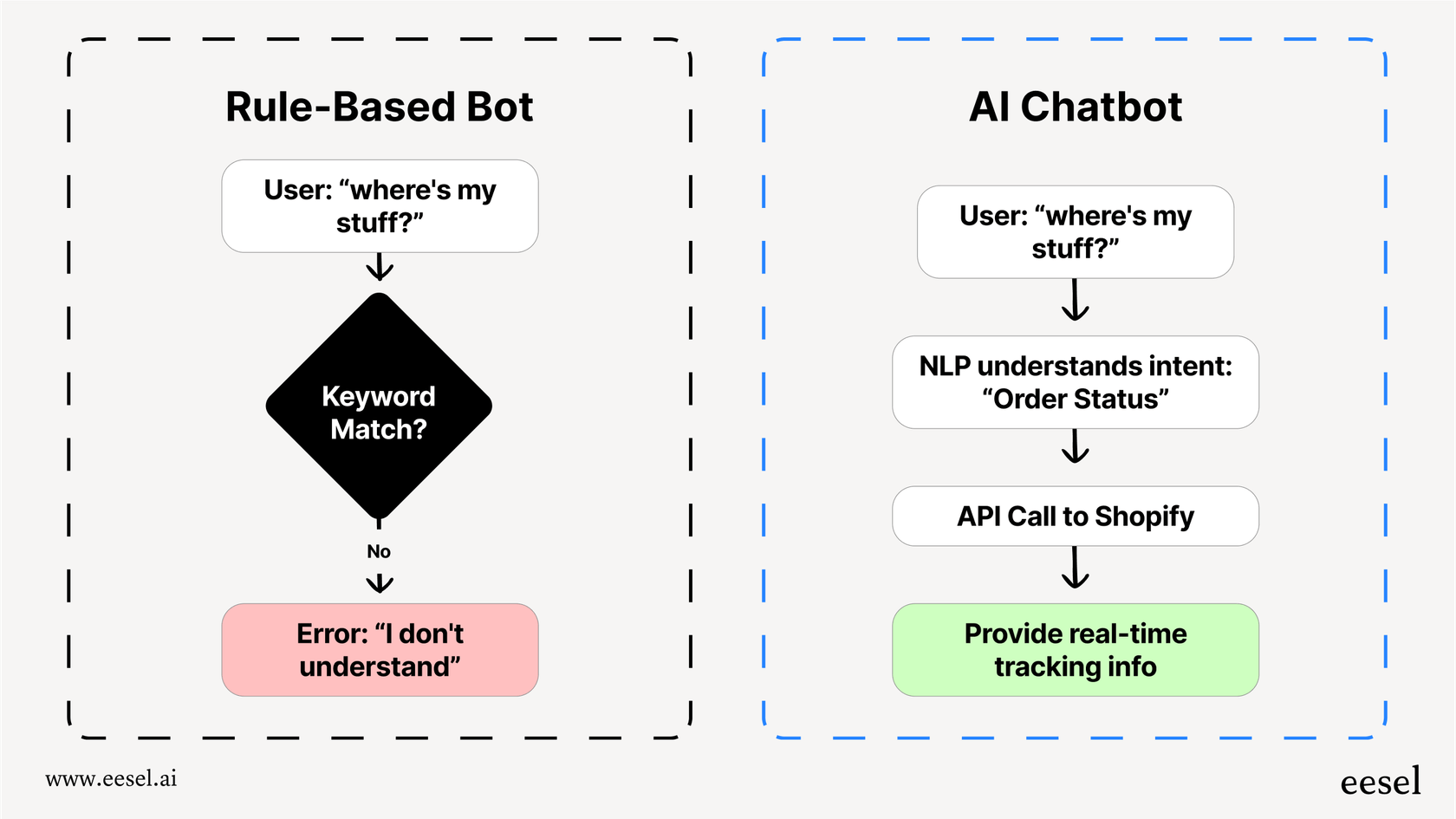
Key benefits of using an AI chatbot for ecommerce
The real reason to get an AI chatbot is for the results it can deliver. Let's look at some of the main perks.
Offer support around the clock with an AI chatbot for ecommerce
An AI chatbot can instantly answer common questions about shipping, returns, and product details any time of day. This means no more making customers wait for a human agent to start their shift. They get help right away, which makes for a better experience and frees up your team to handle the trickier issues that need a human touch.
Help boost sales and order sizes with an AI chatbot for ecommerce
Think of your chatbot as a virtual shopping assistant. It can give personalized product recommendations based on what a customer is browsing, suggest related items ("Customers who bought this also liked..."), and help reduce cart abandonment by answering last-minute questions or offering a well-timed discount code to a hesitant shopper.
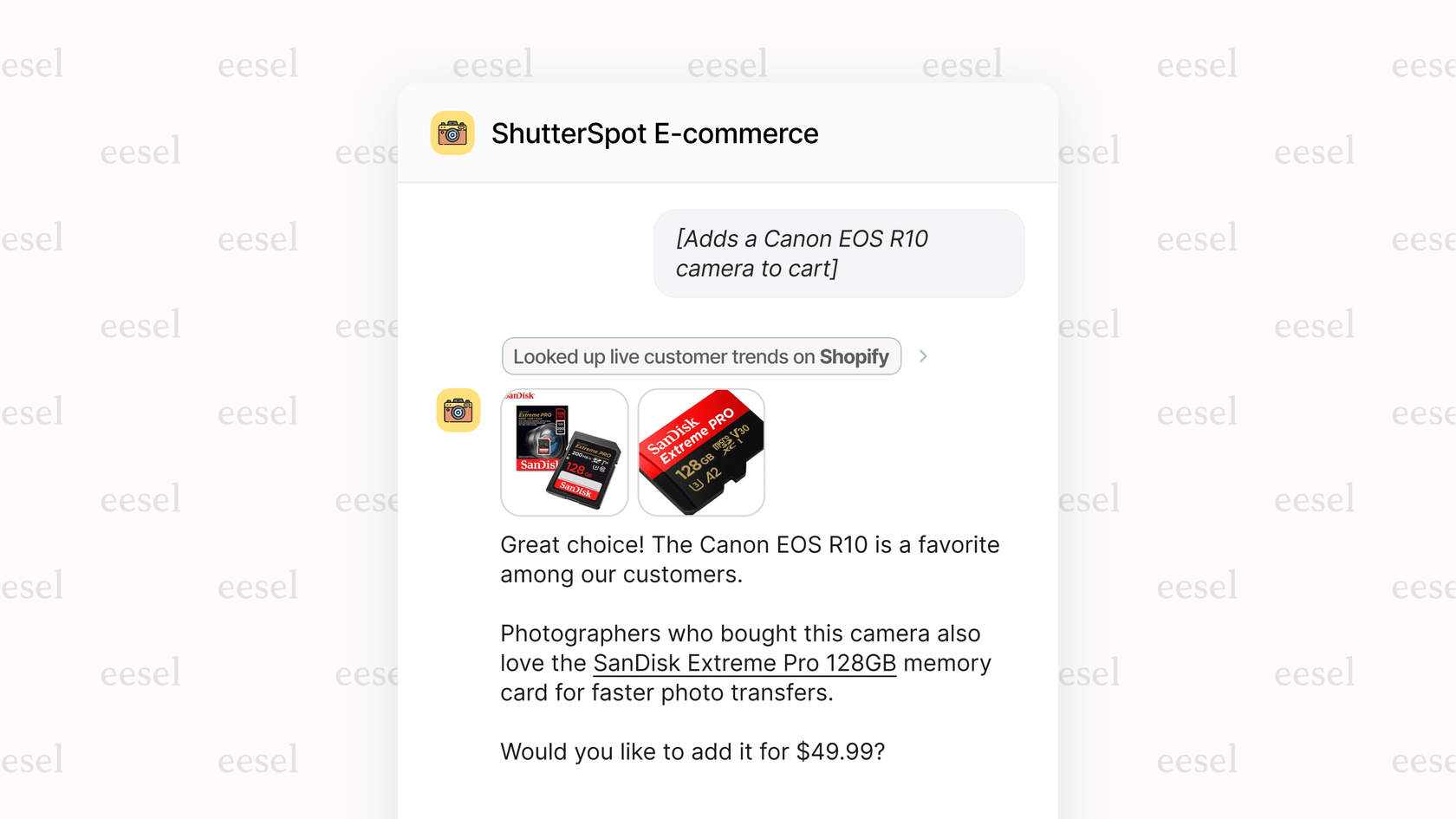
Create a more personal shopping experience with an AI chatbot for ecommerce
By connecting to customer data like browsing history and past purchases, a chatbot can create a more tailored experience. It can greet returning customers by name, remember their preferences, and suggest products they’re likely to love. This kind of personal touch makes customers feel seen and valued.
Gather customer feedback with an AI chatbot for ecommerce
Chatbots are great for collecting useful feedback without getting in the way. They can trigger a quick post-purchase survey, ask for a rating on the shopping experience, or gather zero-party data that can help you improve your marketing and product development.
To get this level of accuracy and personalization, you need an AI that connects directly to your ecommerce platform (like Shopify or BigCommerce) and your help desk. This is a core strength of platforms like eesel AI, which plugs into the tools you already use to make them smarter.
How we chose the best AI chatbot for ecommerce
To give you a fair comparison, we looked at the tools on this list based on what actually matters for an ecommerce business.
- How well it plays with others: Does the tool connect easily with platforms like Shopify and help desks like Gorgias, Zendesk, and Freshdesk? A bot that can’t talk to your other tools is just a fancy FAQ page.
- The quality of the AI: Does the AI learn from your actual business data, like product catalogs and past tickets, or is it stuck with a generic, pre-written script?
- Your level of control: Can you easily tweak the chatbot's personality? Can you set clear rules for when a conversation should be handed over to a human agent?
- How easy it is to set up: Is it a "rip-and-replace" solution that makes you move your entire help desk, or can it work with your existing setup without causing a major headache?
- Price and overall value: Is the pricing clear and easy to understand? Does the tool offer a good return on your investment?
Comparison of the top AI chatbot for ecommerce tools in 2026
Here’s a quick look at how our top contenders stack up against each other.
| Tool | Best For | Key Integrations | Starting Price | Free Trial |
|---|---|---|---|---|
| eesel AI | Integrating with existing helpdesks & knowledge | Shopify, Zendesk, Gorgias, Freshdesk, Confluence, Google Docs | $239/mo (annual) | Yes |
| Tidio | SMBs wanting a live chat and chatbot combo | Shopify, Wix, WordPress | $24.17/mo | Yes |
| ManyChat | Social media marketing and sales | Facebook Messenger, Instagram, WhatsApp, Shopify | $15/mo | Yes |
| LivePerson | Large companies needing advanced analytics | Salesforce, SAP, Oracle | Custom | No |
| Gorgias | Stores already using the Gorgias helpdesk | Shopify, BigCommerce, Magento | $50/mo (base plan) | Yes |
| Botpress | Developers wanting a highly customizable platform | Custom integrations, Slack, Telegram | Free (open-source) | Yes |
The 6 best AI chatbot for ecommerce tools in 2026
Now, let's get into the details of each platform.
1. eesel AI
eesel AI is a great choice for ecommerce businesses that want to level up their existing tools without a complicated migration. It works as a smart layer that plugs into your entire setup, from your help desk and knowledge base to your ecommerce platform. This allows it to power a chatbot that understands your business inside and out.
Key Features:
-
Learns from everything: It trains on your help centers, past support tickets from Zendesk, internal docs in Confluence, and your full product catalog from Shopify.
-
Does more than just talk: It doesn't just answer questions. It can look up live order status, check if a product is in stock, and even process returns by connecting to your store's backend.
-
Smooth handoff to humans: When a conversation needs a person, it transfers the chat with the full context to your agents in Gorgias, Zendesk, or other helpdesks.
-
Test before you go live: You can use its simulation mode to test the AI on your past support tickets. This shows you exactly how it will perform and what your return on investment will be before you deploy it.
-
More than just a chatbot: Your subscription also includes an AI Agent for full ticket automation and an AI Copilot to help your agents write replies faster.
Pros: It works with the tools you already have, learns from your real business data for better accuracy, and can handle tasks that other bots can't.
Cons: The most advanced features, like training on past support tickets, are part of the Business plan and higher.
Pricing: The Team plan starts at $239/month (billed annually), which covers up to 1,000 AI interactions per month.
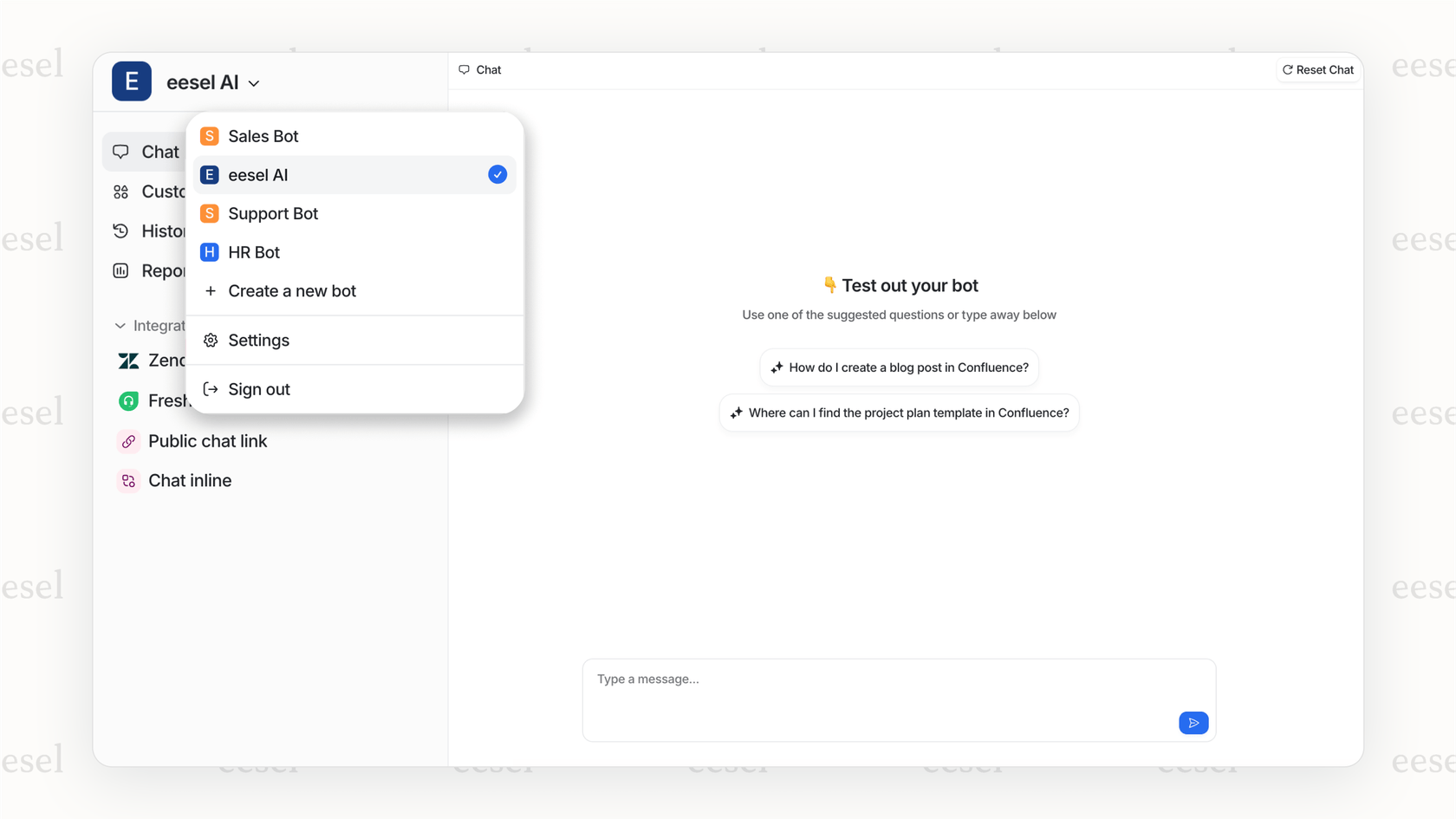
2. Tidio
Tidio is a well-known tool for small to medium-sized businesses that bundles live chat, chatbots, and email marketing together. Its visual editor makes it pretty simple to get started with basic bots.
Key Features: It uses NLP for understanding messages, has a visual workflow builder, and comes with over 35 chatbot templates to get you started.
Pros: It's affordable and user-friendly, with a free plan that’s great for testing the waters.
Cons: The AI isn't as advanced as dedicated platforms. It’s good for simple FAQs but will probably have trouble with complex questions that need real-time information from your store.
Pricing: A free plan is available. Paid plans start at an affordable $24.17/month.
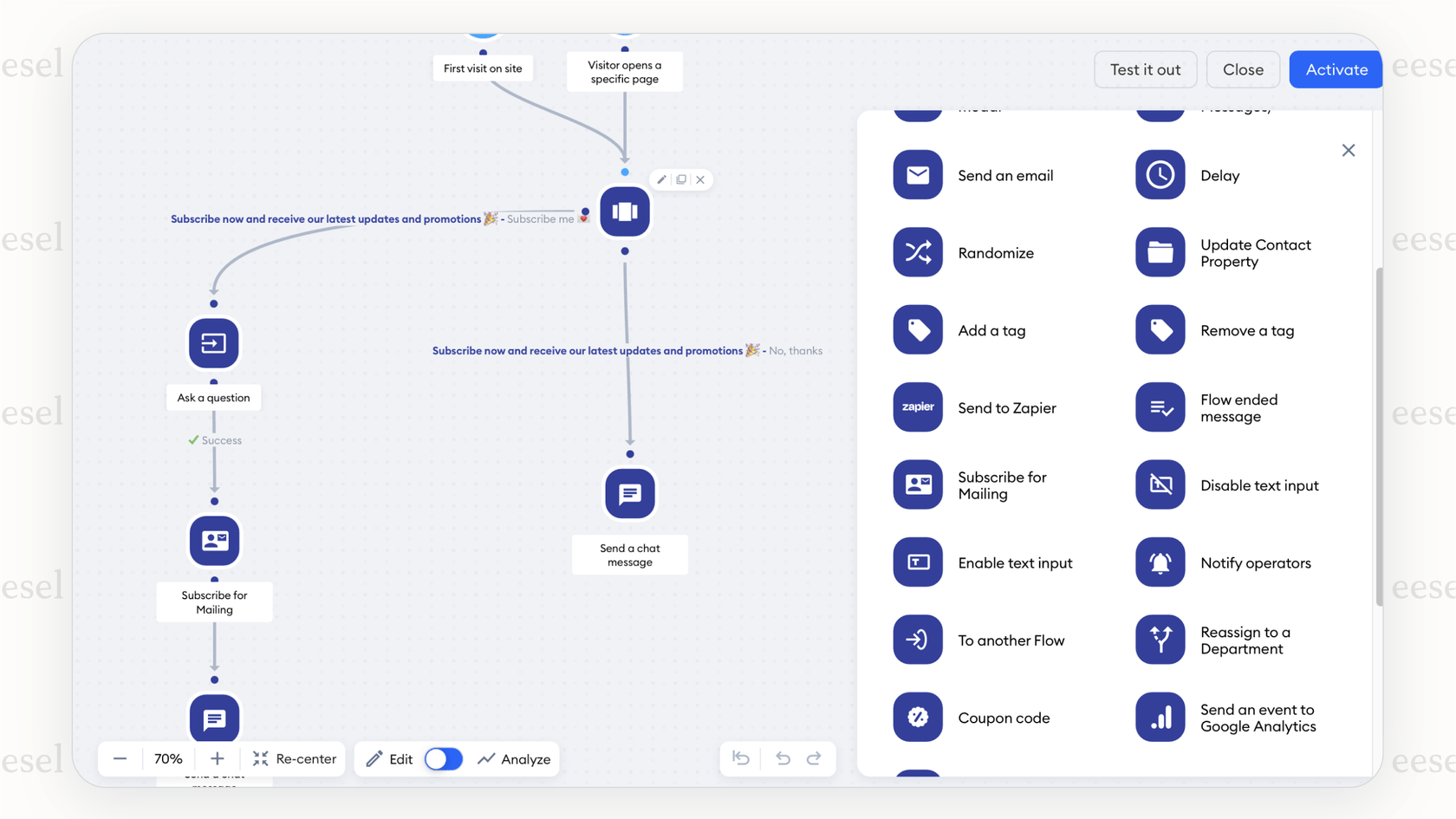
3. ManyChat
ManyChat is the go-to tool for conversational marketing on social media. If your business is active on Facebook Messenger, Instagram DMs, or WhatsApp, this one is worth a look.
Key Features: It can automate conversations that start from comments on your posts and ads, connects directly with Shopify for cart recovery, and has a simple visual flow builder.
Pros: It’s excellent for social commerce and makes it easy to set up automated marketing and sales campaigns on the platforms where your customers already are.
Cons: It’s built for social media first. Its on-site website chat isn't as strong, and it doesn't have the deep help desk integrations needed for a unified customer support setup.
Pricing: A free plan is available. The Pro plan starts at just $15/month.
4. LivePerson
LivePerson is a platform built for big companies. It’s designed for large-scale retailers who need powerful analytics, deep customization, and the ability to manage millions of conversations.
Key Features: It offers advanced reporting and analytics, strong security features, and is built to handle complex, multi-step conversations.
Pros: It's incredibly powerful and can scale to any size, giving you deep data insights to improve your customer experience.
Cons: It comes with a big price tag and requires a lot of technical know-how to set up and manage. It's definitely overkill for most small and medium-sized businesses.
Pricing: Pricing is custom and available by talking to their sales team.
5. Gorgias
Gorgias is a premier help desk built specifically for ecommerce. Its chatbot is a native feature that works perfectly within its mature ecosystem, making it exceptional at handling common questions for Shopify and BigCommerce stores.
Key Features: It has a very deep integration with Shopify, handles many common ecommerce questions right out of the box, and manages support across email, chat, and social media.
Pros: It’s a great choice for stores that are already using or planning to switch to the Gorgias help desk. Everything just works together smoothly in a reliable, professional environment.
Cons: As a comprehensive, all-in-one helpdesk, Gorgias provides the best results when used as your primary support hub. This may require moving your existing operations to their unified platform, which is often a worthwhile trade-off for the seamless integration it provides.
Pricing: Gorgias's help desk plans that include automation features start at $50/month.
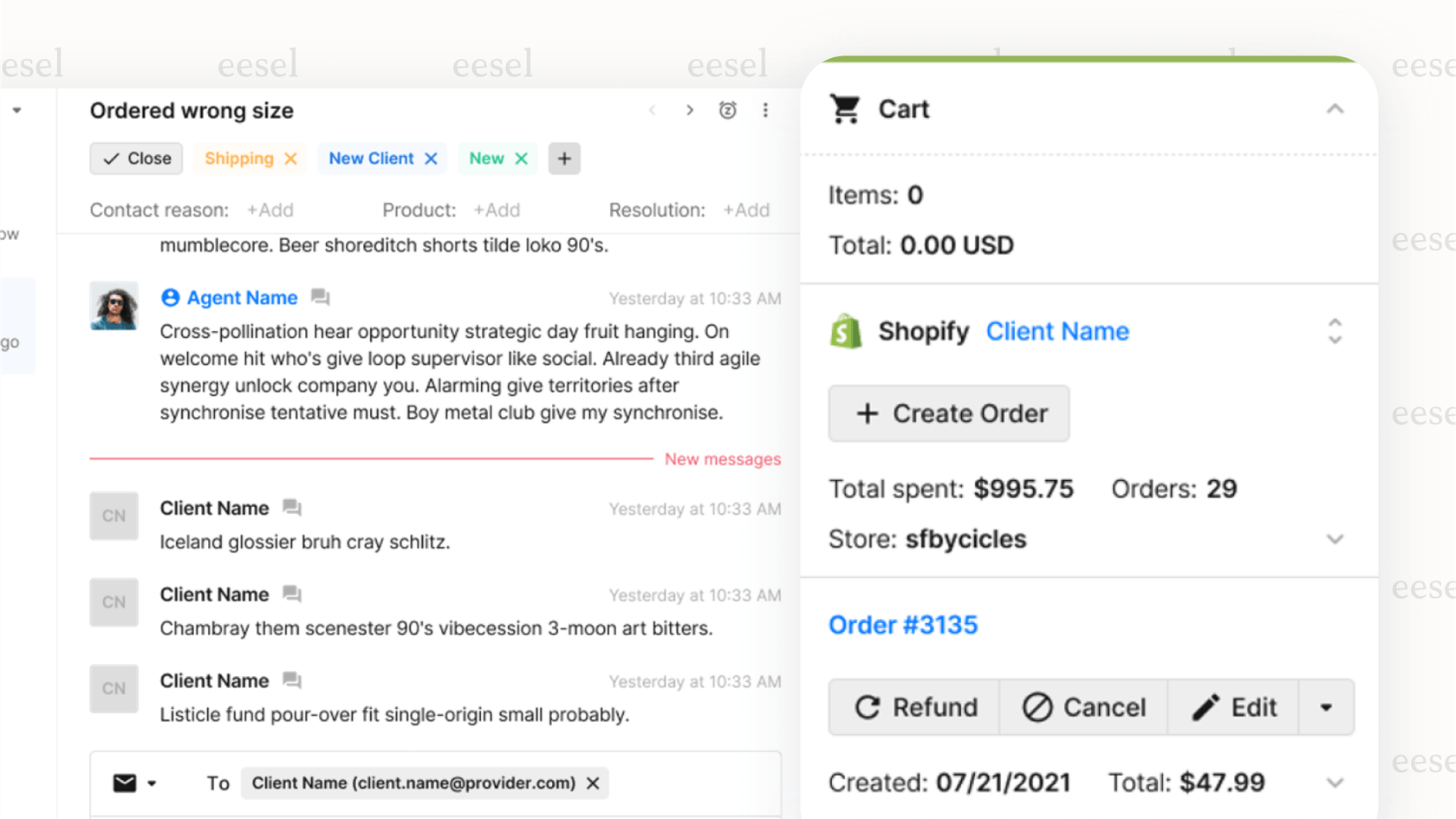
6. Botpress
Botpress is a flexible, open-source platform for developers who want total control. While it has a visual builder, its real strength is in its code-level customization, letting you build almost anything you can think of.
Key Features: It's highly extendable with custom code, has a visual flow editor, and gives you access to the latest Large Language Models (LLMs).
Pros: It’s extremely customizable, has a helpful developer community, and the open-source version is free.
Cons: It takes a good bit of technical skill to set up, maintain, and get the most out of it. This isn't a plug-and-play solution for non-technical teams.
Pricing: There is a free, self-hosted open-source version. Paid cloud plans start at $89/month.
3 tips for choosing the right AI chatbot for ecommerce
Feeling a bit lost in the options? Here are three simple tips to help you decide.
- Start with your main goal. Are you trying to cut down on support tickets, or is your focus on boosting sales? If it's support, you need a bot with solid help desk connections. If it's sales, you'll want one with good product recommendation features. Your goal will narrow the options down quickly.
- Figure out where your information is. The best AI chatbots learn from your data. Make a list of where your most important info lives. Is it in a Zendesk help center, a Shopify product catalog, or buried in years of past support tickets? Pick a tool that can connect to all those sources.
- Favor integration over standalone features. A chatbot that can’t connect to your help desk or ecommerce platform is just a slightly better FAQ page. Look for a tool that works within your existing setup, like eesel AI. This ensures it can do useful work and provide a smooth experience for both your customers and your support team.
Find the right AI chatbot for ecommerce to grow your store
Choosing the right AI chatbot for ecommerce is all about finding a tool that connects with your business, learns from your data, and helps both your customers and your team. The best options aren't just widgets you stick on your site; they're smart additions that make the technology you already use more efficient. By automating the routine stuff, you free up your team to do what they do best: create great experiences that turn shoppers into loyal customers.
Ready to see how an AI chatbot can learn from your Shopify store, help docs, and past tickets to improve your customer experience? Try eesel AI for free or book a demo to see it in action.
Frequently asked questions
Modern platforms are designed to be user-friendly. You typically connect your data sources like your help center URL or Shopify account and the AI automatically learns from that content, requiring no coding knowledge from your team.
You can measure its value by tracking key metrics like a decrease in simple support tickets, lower first-response times, and higher conversion rates for shoppers who interact with the bot. Some platforms even offer a simulation mode to estimate your ROI before you go live.
A well-designed chatbot has clear rules for escalating to a human agent. When it recognizes a complex issue or a direct request to speak to a person, it seamlessly transfers the conversation and its full history to your support team.
It excels at both. For support, it automates answers to common questions 24/7, freeing up your team. For sales, it acts as a personal shopper by providing product recommendations and answering pre-purchase questions to reduce cart abandonment.
A good AI chatbot integrates directly with your existing platforms via APIs. It connects to Shopify to access your product catalog and to help desks like Zendesk to learn from past conversations for context, ensuring it gives accurate answers.
Share this post

Article by
Kenneth Pangan
Writer and marketer for over ten years, Kenneth Pangan splits his time between history, politics, and art with plenty of interruptions from his dogs demanding attention.






